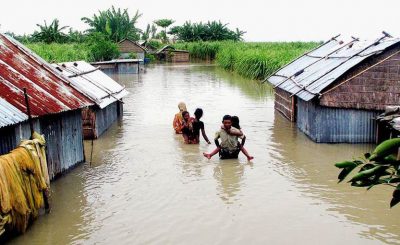Bangladesh DDM photo
By
Sheuli Akter
In recent weeks, severe monsoon rains have triggered extreme floods in parts of Bangladesh, affecting over 100,000 people. Dozens of lives have been lost and thousands of people have been forced from their homes.
The extensive humanitarian needs have prompted the International Federation of Red Cross and Red Crescent Societies (IFRC) to launch a 1.7 million USD that aims to help 105,000 people to rebuild their lives.
In a statement the IFRC said it is appealing for 1.7 million U.S. dollars to support the Bangladesh Red Crescent in reaching 105,000 people with emergency assistance.
In total, around 3.7 million people have been affected by the seasonal floods caused by heavy monsoon rains, IFRC said.
Close to a quarter of a million homes have been damaged or destroyed, it said and added high river levels have also resulted in widespread river erosion, forcing many communities to relocate. Government figures estimate that almost 17,000 houses have been completely washed away.
According to the statement, the floods have impacted nineteen districts across the country, with the northern districts of Jamalpur, Shirajganj, Tangail, Kurigram and Gaibanda of greatest concern. They were first to be hit by flooding at the end of July.
“The floods have inflicted significant damage and hardship across the country. Homes have been completely destroyed, there’s a shortage of clean water and lack of toilets. People’s livelihoods have been left in tatters,” said Mozharul Huq, secretary general of the Bangladesh Red Crescent Society.
Communities in Bangladesh have become accustomed to dealing with floods, but this year’s monsoon season has been particularly bad. Floodwaters have started to recede in some areas across northern districts as they move south towards the Bay of Bengal, said the IFRC statement.
“Receding floodwaters do not mean the end of the problem – quite the opposite,” said Huq. “This is when people really need help to rebuild their homes and lives. They also need support to ensure they are better prepared for such recurring natural disasters.”
Climate change has led to an increase in the frequency and intensity of natural disasters in Bangladesh, it said and added the monsoon floods follow closely behind Cyclone Roanu which struck the country in May, affecting around 1.3 million people.
“This emergency appeal will provide vital assistance to thousands of people affected by the floods,” said Azmat Ulla, IFRC head of delegation in Bangladesh. “However, my big concern is that the frequency of these natural disasters in Bangladesh has led to donor fatigue. We are committed to providing effective humanitarian aid at a local level, but we can only do so with the necessary international financial support.”
To date, Bangladesh Red Crescent volunteers have distributed food to more than 27,000 people. The Red Crescent is using nine water treatment kits, which can each treat water at a rate of 1,000 litres/hour, to provide clean drinking water to 15,000 people across Bogra, Sirajganj, Jamalpur and Kurigram.



No Comments Yet!
You can be first to comment this post!